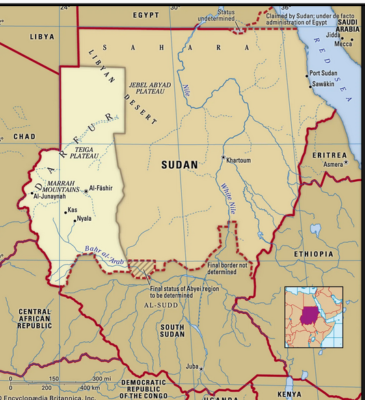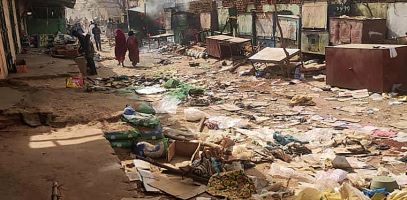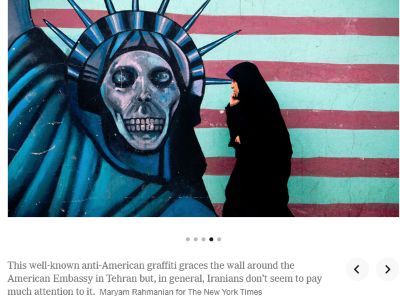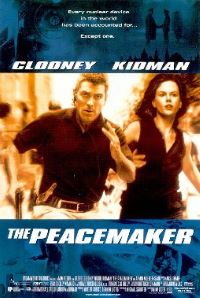
Lately, there has been a lot of talk about genocide. In this blog I wish to address one significant example of genocide that was not received a lot of attention. I am referring to Darfur. As will be seen, the area and the people are victims of British colonialism and arbitrary map-drawing developments.
Think for example in Iraq. There the British did not include Kuwait in the new artificial country of Iraq. Hence what Saddam Hussein did was an invasion of a foreign country. On the other hand, the Kurds, or at least some of them, were included in Iraq. This meant their resistance could be labeled an insurrection. Thanks to the American protective zone, the Kurds were able to create a defacto country within Iraq. These boundary lines show how even a century or more later, we have to live with the consequences of the lines in the sand drawn by (British) imperialists.
SUDAN
Sudan is one of the artificial countries in Africa created by Europeans, specifically, the British in this case. The following recap comes from Tim Jeal, Explorers of the Nile: The Triumph and Tragedy of a Great Victorian Adventure (Yale University Press 2011). The bulk of the book deals with these great adventures to seek the source of the Nile in ancient times and through Victorian times. The last section deals with the consequences of the mainly 19th century search which continue to reverberate to this very day.
Samuel Baker, one of the explorers, in May 1871, raised the Egyptian flag over Gondokoro. The city on the east bank of the White Nile represented the upriver limit for European vessels before reaching the swampy, nearly impassable Sudd. He renamed it Ismailia and declared a new Egyptian province that extended as far south as Buganda and Lake Albert, deep into Africa. His anti-slavery actions earned the support of black African tribes and the enmity of Arab slave traders. His actions also heralded the “Scramble for Africa” which would partition a continent. Jeal notes:
… Baker’s recipe for creating new colonies , with a few steamers and a regiment or two, had little to do with adventure and a lot to with brushing aside legitimate African rulers, whose only crime was to have indicated they wished to remain independent in the face of superior might (343).
But the proposed Equatoria province with the extension of Egypt’s and Sudan’s border south failed with disastrous consequences.
In 1894, Parliament declared Uganda a protectorate. It incorporated Equatoria as its immense northern province. In 1898, Kitchener triumphed over the Madhists in the one-sided Battle of Omdurman on the west bank of the Nile opposite Khartoum, The battle has been likened to a mass execution. The combatants were like armies from different centuries. The victory made Britain the effective ruler of Sudan. It now controlled the entire White Nile.
France had been angling to create an east-west corridor, but was prevented from doing so.
By the terms of the Anglo-French Declaration … France allowed Sudan’s border to be stretched westwards at its expense and to incorporate Darfur within Sudan – an arrangement not considered momentous at the time, but of immense importance a century later when an independent Arab government in Khartoum was able to practice ethnic cleansing with impunity against Darfur’s black Muslims because they lived within Sudan’s legal borders. Before 1898, the Sultanate of Darfur had been fully independent (393).
Equatoria had been an entirely African territory in which the northern Arabs were considered invaders and exploiters. Britain then apportioned the failed province between Uganda and Sudan. Uganda received an influx of Nilotic people with whom the southern Bantu including the Buganda had nothing in common. The Arabs of northern Sudan expanded to include southern tribes. They derided the culture of the people whom they had long raided and enslaved.
An almost incalculable amount of suffering would spring from Britain’s decision to dispose of Equatoria so casually (398).
The actions of Sir Harold MacMichael who was the top civil servant in Sudan highlight the problem. He was stationed in Khartoum which he loved and avoided visiting the bog upriver to the south. Finally in 1927, he visited it and was “shocked to the core” per Jeal. It was a giant swamp or an endless mud-baked plain. The Dinka, Nuer, and Annuak who lived in this hot and treeless wilderness were a tall, physically graceful, and proud people who were absolutely determined to preserve their way of life in their remote and inaccessible habitat. According to Jeal, MacMichael “feared that it would be impossible to persuade such people to embrace ‘civilisation’ as the norther Arabs appeared to wish do” (399). Consequently since the area was of no economic value, MacMichael refrained from any infrastructure development there. The British administrators in Khartoum responsible for the south Sudan became known as “Bog Barons.”
There was a genuine fear among the Bog Barons that education per se might undermine a rich traditional way of life without putting anything of value in its place (401).
Jeal optimistically states that the south could have been saved from subordination and second-class citizenship in an independent Sudan, but no such political decision was made. The “south was now doomed to be subservient after independence” (402). Nor could the Nilotic people of south Sudan become part of Uganda with its Bantu-dominated south either. Yet the South Sudan was not going to accept absorption and control by the Moslem north. Ultimately, after a long and bloody “civil war,” these two areas separated and South Sudan became a new country. In the meantime, the black Moslems in the formerly independent kingdom of Darfur continued to suffer genocide from the Arab Moslem north.
DARFUR

DARFUR (Getty Images)
A series of recent newspaper articles tell the tale about Darfur.
“Sudan’s War Sends a Fresh Wave of Refugees from Darfur to Chad,” (NYT, May 17, 2023, print).
“A ‘Dystopian Nightmare’ Unfolds in Sudan’s Battered Darfur,” (NYT, June 8, 2023, full-page print).
“Death and Displacement Return to Darfur,” (NYT op-ed column, July 5, 2023, print), which puts the current conflict in its historical context dating back to its Sudan’s creation.
“Sudan conflict brings new atrocities to Darfur,’ (AP in Gannett, July 30, 2023).
“UN: Sudan has plunged into humanitarian crisis,” (AP in Gannett, August 7, 2023, print).
“War Drives South Sudanese Back to Ill-Prepared Homeland,” (NYT September 8, 2023, print, front-page above-the–fold)
People who had fled war in Sudan to South Sudan. Now they were returning to a country experiencing a vicious civil war that has generated over 5 million refugees. Fillipo Grandi, the U.N. High Commissioner for Refugees, said in an interview in South Sudan:
The very low level of funding in response to the emergency in Sudan and from Sudan is really shame. This needs to change (NYT, September 8, 2023).
“Left ‘Broken Pieces’ as Darfur Clashes Force New Generation to Flee,” (NYT, September 22, 2023).
“Sudan’s Civil War Isn’t Over, but General Takes a Victory Lap: His Paramilitary Force Is Secretly Being Armed By U.A.E., Report Says,” (NYT January 20, 2024, print, one full page).
“Atrocities Rise in Sudan by Two Warring Forces: U.N. Stark Report Documents the Horrors,” (New York Times February 25, 2024, print).
The article refers to ethnic rampages, accompanied by rape and looting that killed thousands in the western region of Darfur. Sudanese soldiers displayed decapitated heads of students who were killed on the basis of their ethnicity. The war has displaced eight million people.
“Israel, Gaza and Double Standards,” (NYT March 3, 2024, print, op-ed piece Nicholas Kristof).
He compares the waves of atrocities unleashed against the people of Sudan. He three million displaced children exceeds the entire population of Gaza. The 700,000 children facing severe acute malnutrition are ignored by university students in Europe and America. And this is happening a mere two decades after Darfur endured what may be described as the first genocide of the 21st century.
“The World Has Been Unforgivably Silent on Sudan,” (New York Times, March 19, 2024, print, Linda Thomas-Greenfield, U.S. ambassador to the United Nations).
“Generals’ Fight in Sudan Brings a Year of War,” (New York Times April 16, 2024, print).
Hunger. Displacement. Collapse of education system that once drew foreigners. Atrocities continue to mount in Darfur where 300,000 were killed and millions other displaced from 2003 to 2008.
Rather than aid, nations are pouring arms into the war. The current atrocities in Darfur are reminiscent of those in 2004. 18 million people face hunger and 8 million have been displaced. The silence of the response has been deafening.
“Sudanese City in Darfur, Ringed by Paramilitary Troops, Fears Wave of Ethnic Slaughter,” (New York Times, April 30, print).
What is the African American position on funding for Sudan, South Sudan, and Darfur and recommendation on what the United States should do there?
“In Darfur, Genocide May Be Happening Again,” (New York Times, May 16, 2024, print, op-ed column by Nicholas Kristof).
The atrocities two decades ago galvanized a vast response led by protesters across the United States. Senators Barack Obama and Joe Biden were part of an outcry by tens of thousands of high school and college students plus activists, churches, synagogues, and mosques working together. There were sanctions, peacekeeping forces, and the ousting of the genocide leader.
“Some of the same Arab forces responsible for the genocide in the 2000s are picking up where they left off. They are massacring, torturing, raping and mutilating members of non-Arab ethnic groups.” They mock the victims as being “slaves” and utter racial taunts. Darfur has been abandoned. “Never again” has become “one more time.”
The scale of the devastation in Darfur dwarfs that of in Gaza yet the college students are quiet. The massacre of non-Arabs by Arabs evokes no outrage. The students are not woke to this event.
AFRICAN AMERICANS
African Americans remain silent as well. The failure of the term “African American” to create an African-based identity for Middle Passage People as championed by Jesse Jackson is illuminated by an article “Sudanese Mourn 2 Teens Shot Dead by a Deputy” (New York Times, September 19, 2023, print). The article is about second-generation émigrés who had fled the violence in South Sudan for the safety of Syracuse, New York. Chol Majok, a member of the Syracuse Common Council and former South Sudan refugee said:
“When we came to this country, we were looking for second chances in life. There is tremendous faith, in our community, in this country. And everything it has to offer…We have been just trying to tell to the community, especially as people that are in a position of leadership that are South Sudanese, is that we keep the faith, the faith that helped us cross the oceans and brought us to this land, that that faith still shines and still burns. And that’s what we lean on.”
Spoken like a true immigrant.
However, H. Bernard Alex, president of the Syracuse chapter of the National Action Network, in his comments differentiated between the “’African and African American communities who call Syracuse and Onondaga County home.’” He “acknowledged that there are sometimes differences between traditional Black communities and newly arrived African residents in Syracuse.”
“They have to try to fit in somehow with African Americans, in schools and neighborhoods. African American Americans are not always very kind to Africans.”
At this point, who cares about genocide in Darfur other than the people in Darfur itself? And what exactly should anybody, meaning the West, meaning the United States do about it? Sanctions? Blockade? Boots on the ground? Would college students support it? Would progressives support it? Would MAGA support it? Do African Americans care? Would the thought even occur inside the Oval Office? In short, there doesn’t seem to be much anyone can do to stop the genocide in Darfur until the Sudanese Arabs run out people to kill because they are all dead or refugees.





